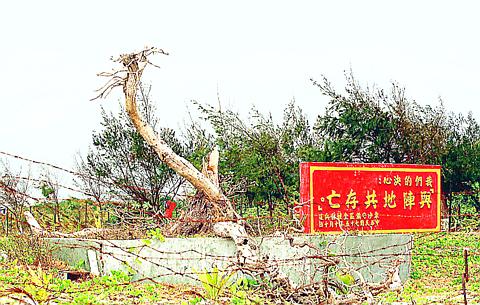Plans by Taiwan to replace the military presence on the Pratas (東沙) and Spratly (南沙) islands in the South China Sea with a civilian force is not strategically justifiable, military analysts say. This is despite claims that this force could be effective for the handling of fishing disputes with China or pirate attacks in the region.
"Unless the government has decided to abandon the two islands, which are a long away from Taiwan proper, it should not confuse their strategic value with their tactical uses," said military analyst Su Chin-chiang (
"Replacing troops with a police force is equal to downgrading the strategic value of the two islands. It should not happen," Su said. "The armed forces' job is to defend the country's territory, while the police's job is to maintain social order. It is the same in most other countries."

PHOTO: CHANG CHUNG-YI
The troop withdrawal plan is to coincide with the establishment next year of the new Coast Guard Administration, which will bring together elements of police, customs and military forces that currently protect Taiwan's shores.
Su also pointed out that police are not properly trained to defend a country's territory in case of attack and would be unable to make effective use of weapons and equipment for this purpose.
"It seems that the government plans to leave the defense of these two islands to a police force only because it thinks the armed forces cannot hold them against an invasion."
The government could have handled the matter better, Su said, if they sent both troops and police to carry out their respective functions on the islands.
Lin Yu-fang (
"The plan is confusing and illogical. If the armed forces cannot defend the two islands against an invasion, the police will be even less capable of doing so," Lin said.
"If there is any meaning behind the move, it could be only that the government wants to abandon less important territories like the Pratas and Spratlys, so that it can focus its troops on defending Taiwan proper, as well as the Penghu, Matsu and Kinmen islands, in an attack by China," he said. "This is not a smart move since China will not attack the two islands if its aim is Taiwan."
"It is true that Taiwan's air force and navy do not have the ability to project their power into the South China Sea. But China does not have that ability either," Lin said. A better way to avoid a confrontation with the Chinese troops, he said, would be not to pull troops out of frontline posts but to take the initiative in peace talks.
KMT lawmaker Chen Ching-po (
"The troops on Kinmen and surrounding islets now number less than 10,000 -- a great reduction from 50,000-some at their peak," Chen said.
Minister of National Defense Tang Fei (
"The armed forces do not have the capability to defend the two islands, since they are beyond the range that the air force and navy can efficiently operate," Tang said.
"If we use a lot of energy and resources on defending the two islands, the safety of Taiwan proper and other major territories will be put at greater risk," he said.

The CIA has a message for Chinese government officials worried about their place in Chinese President Xi Jinping’s (習近平) government: Come work with us. The agency released two Mandarin-language videos on social media on Thursday inviting disgruntled officials to contact the CIA. The recruitment videos posted on YouTube and X racked up more than 5 million views combined in their first day. The outreach comes as CIA Director John Ratcliffe has vowed to boost the agency’s use of intelligence from human sources and its focus on China, which has recently targeted US officials with its own espionage operations. The videos are “aimed at

STEADFAST FRIEND: The bills encourage increased Taiwan-US engagement and address China’s distortion of UN Resolution 2758 to isolate Taiwan internationally The Presidential Office yesterday thanked the US House of Representatives for unanimously passing two Taiwan-related bills highlighting its solid support for Taiwan’s democracy and global participation, and for deepening bilateral relations. One of the bills, the Taiwan Assurance Implementation Act, requires the US Department of State to periodically review its guidelines for engagement with Taiwan, and report to the US Congress on the guidelines and plans to lift self-imposed limitations on US-Taiwan engagement. The other bill is the Taiwan International Solidarity Act, which clarifies that UN Resolution 2758 does not address the issue of the representation of Taiwan or its people in

US Indo-Pacific Commander Admiral Samuel Paparo on Friday expressed concern over the rate at which China is diversifying its military exercises, the Financial Times (FT) reported on Saturday. “The rates of change on the depth and breadth of their exercises is the one non-linear effect that I’ve seen in the last year that wakes me up at night or keeps me up at night,” Paparo was quoted by FT as saying while attending the annual Sedona Forum at the McCain Institute in Arizona. Paparo also expressed concern over the speed with which China was expanding its military. While the US

SHIFT: Taiwan’s better-than-expected first-quarter GDP and signs of weakness in the US have driven global capital back to emerging markets, the central bank head said The central bank yesterday blamed market speculation for the steep rise in the local currency, and urged exporters and financial institutions to stay calm and stop panic sell-offs to avoid hurting their own profitability. The nation’s top monetary policymaker said that it would step in, if necessary, to maintain order and stability in the foreign exchange market. The remarks came as the NT dollar yesterday closed up NT$0.919 to NT$30.145 against the US dollar in Taipei trading, after rising as high as NT$29.59 in intraday trading. The local currency has surged 5.85 percent against the greenback over the past two sessions, central